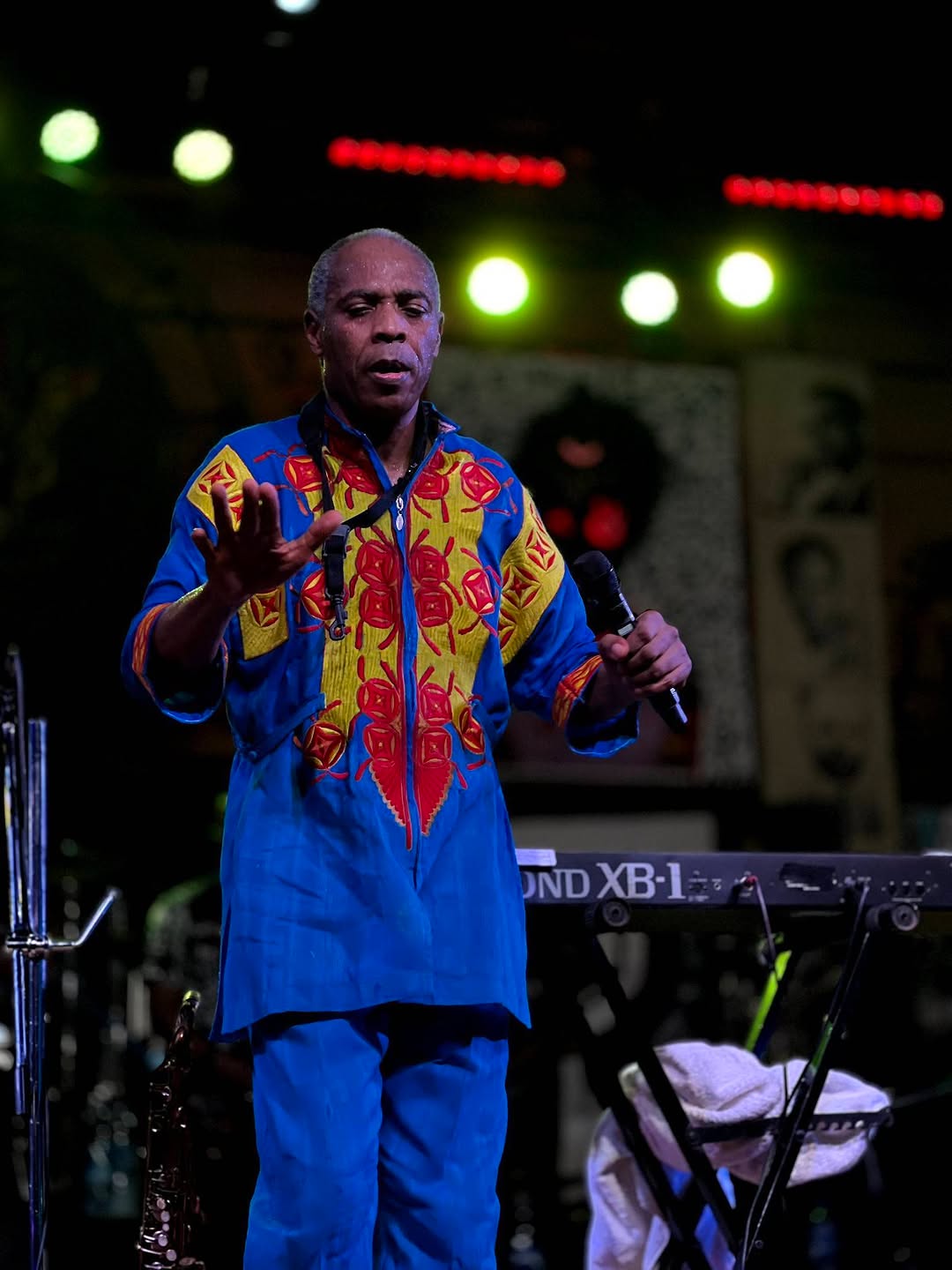
Femi Kuti Biography, Age, Family & Net Worth
Femi Kuti, born Olufemi Anikulapo Kuti on June 16, 1962, in London, England, is a Nigerian musician, singer-songwriter, and multi-instrumentalist celebrated for his impact on Afrobeat. As the eldest son of the Afrobeat pioneer Fela Kuti, he has both preserved and expanded his father’s musical legacy.
Femi began his career performing with Fela’s Egypt 80 band before founding his own group, Positive Force, in 1986. His music fuses Afrobeat with jazz, funk, and highlife, delivering powerful messages on social and political issues through vibrant, horn-driven compositions.
A four-time Grammy nominee, he has released critically acclaimed albums such as Shoki Shoki (1998) and Africa for Africa (2010), solidifying his role as a global ambassador of African music. Based in Lagos, Nigeria, he also oversees the New Afrika Shrine, a cultural center dedicated to his father’s vision.

Early Life & Education
Femi Kuti was born in London, England, but spent most of his life in Nigeria. He is of Yoruba ethnicity, reflecting his family’s roots in southwestern Nigeria. While Femi has not publicly emphasized a specific religious affiliation, his father’s outspoken views and Afrocentric philosophy likely influenced his upbringing.
Femi is the eldest son of Fela Kuti and Remilekun Taylor, a British-Nigerian woman. He grew up in a polygamous household, surrounded by numerous siblings, including Seun Kuti, who also became an Afrobeat musician, and Yeni Kuti, a dancer and cultural figure. Other siblings include Motunrayo Anikulapo Kuti, Kunle Anikulapo Kuti, Sola Kuti, and Shalewa Kuti.
Fela’s unconventional lifestyle and revolutionary ideals shaped Femi’s early environment, exposing him to music, activism, and a dynamic family life.
His formal education details are sparse, as he was immersed in Afrobeat from a young age, learning to play instruments like the saxophone and trumpet under his father’s influence. Rather than pursuing traditional schooling, Femi’s education came through hands-on experience in his father’s band, Egypt 80, where he began performing as a teenager.
Career
Femi Kuti’s career blends musical innovation, activism, and dedication to evolving Afrobeat. His journey began as a teenager when he joined Fela’s Egypt 80 band in 1979 as a saxophonist. Under his father’s mentorship, he mastered jazz, funk, highlife, and West African rhythms, infused with socio-political commentary.
In 1986, determined to establish his identity, Femi left Egypt 80 to form his band, Positive Force. This marked the beginning of his independent career, where he infused Afrobeat with a modern, danceable sound.
His debut album, No Cause for Alarm? (1989), introduced his style, but it was Shoki Shoki (1998) that brought him international recognition. The album’s energy and sharp social commentary earned him a Grammy nomination in 2000 for Best World Music Album.
Femi’s discography showcases his artistic growth and versatility:
- Fight to Win (2001) featured collaborations with Mos Def and Jaguar Wright.
- Day by Day (2008) and No Place for My Dream (2013) earned further Grammy nominations.
- Africa for Africa (2010) tackled themes of corruption and resilience.
- Legacy + (2021), a dual album project with his son Made Kuti, reflected intergenerational collaboration.
Beyond recording, Femi is a magnetic live performer, renowned for his high-energy shows. He also co-manages the New Afrika Shrine in Lagos, a cultural hub that honors his father’s legacy while amplifying Femi’s voice.
Social Media
- Wikipedia: Femi Kuti
- LinkedIn: Femi Kuti – Reliance Health
- YouTube: Femi Kuti
- Instagram: @femiakuti
- Twitter/X: @Femiakuti
- Facebook: Femi Anikulapo-Kuti
Personal Life
Femi Kuti, born on June 16, 1962, is 62 years old. He was previously married to Funke Kuti, a dancer and member of his Positive Force band. They had a son, Omorinmade Kuti (Made Kuti), born in 1995, who has followed in his father’s footsteps.
Femi and Funke later divorced, though the details remain private. He has acknowledged having other children, including Ayomide Kuti, though he keeps details of his romantic life private.
There are no official records of Femi Kuti’s height, but he is described as lean and energetic, fitting his high-energy performances.
Net Worth
Femi Kuti has an estimated net worth of $1.5 million as of recent assessments. His wealth stems from:
- Album sales and international tours
- Live performances at the New Afrika Shrine
- Management deals, including a past contract with Chocolate City Music Group
- Holding a Guinness World Record for the longest saxophone note (51 minutes, 35 seconds) in 2017
While not among Nigeria’s wealthiest contemporary artists, his financial success reflects his enduring influence and dedication to Afrobeat.
Discography
Studio Albums
- No Cause for Alarm? (1989) – Femi’s debut album, marking his break from Egypt 80.
- M.Y.O.B. (Mind Your Own Business) (1991) – Continued defining his Afrobeat style.
- Shoki Shoki (1998) – International breakthrough, Grammy-nominated.
- Fight to Win (2001) – Featured collaborations with Mos Def and Jaguar Wright.
- Day by Day (2008) – Critically acclaimed, Grammy-nominated.
- Africa for Africa (2010) – Raw Afrobeat roots, Grammy-nominated.
- No Place for My Dream (2013) – Addressed social issues, Grammy-nominated.
- Legacy + (2021) – A collaborative project with his son, Made Kuti.
Live Albums and Compilations
- Live at the Shrine (2004) – A live recording of his performances.
- The Definitive Collection (2007) – Compilation of his best works.
Other Notable Works
- Femi has contributed to various soundtracks, remixes, and collaborations, working with artists like D’Angelo and Common.
- His singles, such as “Beng Beng Beng” (Shoki Shoki) and “Truth Don Die” (Fight to Win), are iconic anthems.
CLICK HERE TO COMMENT

Leave a Reply